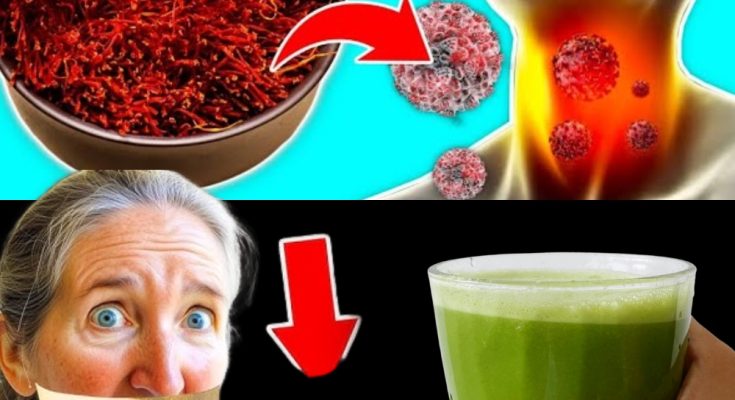🌿 1. Turmeric (Curcuma longa)
Why it works:
Turmeric’s active compound, curcumin, is a potent anti-inflammatory and antioxidant. It has been shown in multiple studies to block cancer cell growth, reduce inflammation, and prevent tumor formation.
How to use it:
Add to curries, golden milk, or smoothies. For best absorption, pair with black pepper or take a curcumin supplement.
🍵 2. Green Tea (Camellia sinensis)
Why it works:
Green tea is packed with EGCG (epigallocatechin gallate), a polyphenol known to slow tumor growth and inhibit cancer cell spread—especially in breast, prostate, and colorectal cancers.
How to use it:
Drink 2–3 cups of freshly brewed green tea daily. Choose organic, loose-leaf varieties for maximum potency.
🧄 3. Garlic (Allium sativum)
Why it works:
Garlic is rich in allicin and sulfur compounds, which have been linked to cancer cell death and enhanced immune defense. Studies show reduced risks of stomach and colon cancers with regular garlic intake.
How to use it:
Crush fresh garlic and let it sit for 10 minutes before eating or lightly cooking. Add to meals daily.
🌶️ 4. Ginger (Zingiber officinale)
Why it works:
Ginger contains gingerol, a bioactive compound shown to inhibit cancer cell proliferation and trigger apoptosis (programmed cell death).
How to use it:
Use fresh ginger in tea, juices, stir-fries, or take supplements (after medical advice).
🌾 5. Milk Thistle (Silybum marianum)
Why it works:
This liver-supporting herb is rich in silymarin, which has antioxidant and anti-inflammatory properties that protect liver cells and may slow cancer growth, especially in liver and prostate cancers.
How to use it:
Available as tea, capsules, or tinctures. Use under professional supervision for proper dosage.
🌱 6. Ashwagandha (Withania somnifera)
Why it works:
A powerful adaptogen, ashwagandha helps the body manage stress—an often overlooked cancer risk factor. It may also suppress cancer cell growth and enhance chemotherapy outcomes.
How to use it:
Take daily in powder or capsule form. Ideal in smoothies, teas, or supplements (consult your doctor for dosage).
🌿 7. Holy Basil (Tulsi / Ocimum sanctum)
Why it works:
Tulsi is revered in Ayurvedic medicine and now recognized for its anti-cancer, antioxidant, and anti-inflammatory properties. It may reduce the risk of oral, lung, and skin cancers.
How to use it:
Sip tulsi tea, chew fresh leaves, or take it as an extract or supplement daily.
🍄 8. Reishi Mushroom (Ganoderma lucidum)
Why it works:
Nicknamed the “mushroom of immortality,” reishi contains beta-glucans and triterpenes that stimulate immune function and slow tumor progression.
How to use it:
Enjoy as tea, powder, or capsules—especially during treatment for immune support (under medical guidance).
🧬 Final Thoughts: Herbs as Allies, Not Cures
While no herb is a magic bullet, these science-backed natural remedies offer serious support in cancer prevention and treatment. When used alongside medical care, they may help:
-
Boost immunity
-
Reduce inflammation
-
Slow cancer growth
-
Enhance treatment effectiveness
👉 Always consult your healthcare provider before starting any new herbs—especially if you are currently undergoing cancer treatment or managing other health conditions.
Nature gives us powerful tools. Let’s use them wisely.



